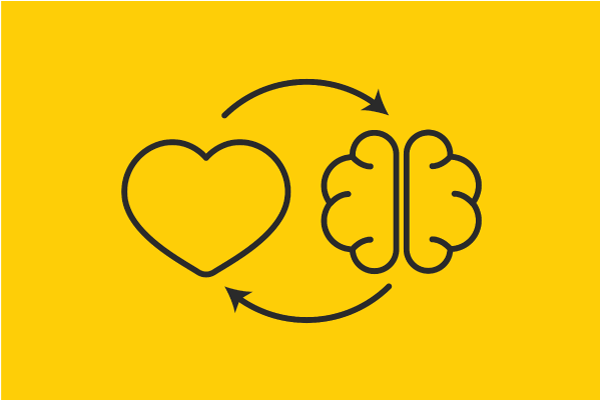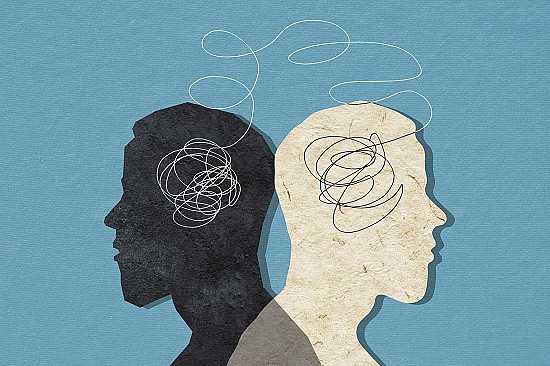Healthy brain, healthier heart?

You probably already know that protecting your heart health requires eating well, exercising, and controlling well-known risk factors for heart disease such as high blood pressure. But did you know that your brain plays an important role in heart health as well?
In recent years, researchers have increasingly found links between poor mental health and higher heart disease risk. This may not be surprising, since mental health disorders can affect your behavior. For example, you might be less likely to get regular exercise or more likely to drink too much alcohol if you're feeling depressed. In addition, some issues that affect our mental health, and certain mental health disorders, may also trigger physical changes in the body that can elevate heart risk in several ways.
Stress
Long-term stress can raise blood pressure, reduce blood flow to the heart, decrease the heart's pumping ability, trigger abnormal pumping rhythms, and activate the blood's clotting system and its inflammatory response. Surprisingly, research shows that chronic stress may be more harmful to your heart than major life changes. One large study found that women who cared for a disabled spouse for at least nine hours a week faced a higher chance of having a heart attack or dying from heart disease than women without such responsibilities.
And a 2020 study published in JAMA Network Open found a specific stress-related heart condition called stress cardiomyopathy — an emotionally-triggered weakening of the heart's left ventricle — rose during the pandemic. Study authors found four times the rate of this condition during March and April 2020 than in three pre-pandemic periods in 2018, 2019, and earlier in 2020.
Traumatic childhood experiences
Traumatic childhood experiencessuch as being neglected; suffering physical, sexual, or emotional abuse; or witnessing violence at homeare known to health professionals as adverse childhood experiences, or ACEs. They may raise risk for developing health-harming behaviors, such as substance use disorders.A 2020 review published online by JAMA Cardiology found that adults who experienced four or more traumatic childhood events had twice the risk of cardiovascular disease and an early death compared with people who didn't have any of these painful experiences.
Depression
The relationship between depression and heart disease is a two-way street. Depression roughly doubles your risk of developing coronary artery disease, according to one review article. Other studies show that people who already have heart disease are three times as likely to be depressed as other people. As many as one in five heart attack survivors develops depression. And depression is an independent risk factor for a subsequent heart attack in people who have already had one. This may be partly because people who are depressed are less likely to quit smoking, take prescribed medications, or exercise — even after a heart attack.
Hostility and anger
People who are habitually angry are two to three times as likely to have a heart attack or other cardiac event as others, according to one review article.
Social isolation
Evidence shows that men and women who live alone are significantly more likely to have a heart attack or die suddenly from one. On the flip side, older adults with a strong network of friends are significantly less likely to die over a 10-year period than those without robust social support.
Moving toward a healthier heart
If you're struggling with any of these issues, there are things you can do to improve your mental health, and potentially your heart health as well.
- Team up with a professional. A mental health specialist can help you work through many challenges, including serious trauma from your past. Talk therapy, such as cognitive behavioral therapy (which is designed to break negative thought patterns) and medication are just a few of the options that might help.
- Make lifestyle improvements. When you're depressed or struggling emotionally, healthy eating and exercise sometimes fall by the wayside. But making small, manageable daily improvements adds up to better overall health. Even small changes like adding more fruits and vegetables to your plate or walking around the house can help. Try to find physical activities you enjoy that can help you stay motivated.
- Keep your brain active.Activities that stimulate your brain can help improve your mental health. Take up a new hobby, add some novelty to your day by trying a new walking route, or try a new activity.
- Curb your stress. Easing stress is a substantial challenge for pretty much everyone these days. One strategy that can help rein it in is mindfulness meditation, which encourages self-awareness and a focus on the present. Regular exercise, a healthy diet, and getting enough high-quality sleep can also help keep stress levels in check.
Ultimately, things that are good for your brain are good for your body — and your heart.
About the Author

Kelly Bilodeau, Former Executive Editor, Harvard Women's Health Watch
Disclaimer:
As a service to our readers, Harvard Health Publishing provides access to our library of archived content. Please note the date of last review or update on all articles.
No content on this site, regardless of date, should ever be used as a substitute for direct medical advice from your doctor or other qualified clinician.















